Enjoy a mysterical adventure at Hobbledown. Meet our animals, play in the Barn, go down our mine and have fun in the party cottage.
Schools Visits


What is it?
A farm is an area of land primarily devoted to the growth of food and upkeep of livestock. The specific outputs of a farm can very greatly, ranging from dairy products to fish to tobacco - anything that can be grown and cultivated can within reason be farmed. In recent years farms have also become somewhat of a tourist attraction, with many working farms allowing for paying guests to look around and experience how it all works; farm animals are often a popular reason for visits!
What does it involve?
Farms generally involve the careful upkeep of the land and everything on it with the aim of selling on the produce gained at the end of the process. The various techniques and styles of farming will vary depending on the produce, the climate and the farmer, but all involve a lot of planning and care!
Why do it and what are the benefits?
A visit to a farm can introduce students to a lot of new things, especially teaching them how the things they see in the supermarket start out either from the ground or from an animal! It will encourage students to be curious about things around them, and increase respect for the processes necessary to provide us with a lot of the food and materials we take for granted.
What equipment do we need?
Visiting a farm shouldn't require any equipment on your behalf! However, one thing you may wish to consider is ensuring the students are dressed appropriately for the weather/outdoors - check with the venue to see what sort of conditions they advise you dress for.
Who is it suitable for?
Farms should be suitable for pretty much anyone, but older students may have less interest than those in younger groups for whom interacting with farm animals may still be a novelty!
Costs?
The costs of accessing a farm are usually reasonably low, with many venues having free entry to encourage people to come and understand just exactly what goes on!
Issues/Things to think about? (unsuitable for age groups, medical conditions etc)
As with any activity that could involve animals or machinery, younger students should be supervised at all times! You must also ensure that your group respects the rules of the farm and don't walk on planted areas/feed animals you shouldn't/pick any products you aren't invited to!
How do we include?
As many farms are primarily businesses, they may not be set up for disabled access, but the larger the establishment the more likely they are to cater for disabilites. A farm visit would be a great thing to take people of all capabilties on, so make sure to check out what the venue's set up is ahead of time.
Doing it abroad?
Foreign farms could be great places to visit! An alternate climate can allow for different plants and animals to thrive, and it would be a good opportunity to see similiarites and differences to farms in the UK.
Main websites:
National Farm Attractions Network (link is external)
School Farms Network (link is external)
Countryside Classroom (link is external)
This webpage (link is external) also has some great recommendations, but check out individual venue websites to see exactly what they have on.
Enjoy a mysterical adventure at Hobbledown. Meet our animals, play in the Barn, go down our mine and have fun in the party cottage.
Schools Visits
Lulworth Castle, built in the early 17th Century as a hunting lodge, became a country house at the heart of a large estate. Thomas Howard, 3rd Lord Bindon, built the Castle in order to entertain hunting parties for the King and Court. The Howards owned it until 1641 when it was purchased by Humphrey Weld, the direct ancestor of the present owners.

A 15-year-old boy fell 60ft over the edge of a cliff whilst on a geography school trip, miraculously only suffering minor injuries.
Handsam Ltd use cookies on this website to enhance your user experience. We are also required to point out to you that this website is not related to, nor do Handsam Ltd have any business relationship with, the website known as TripAdvisor. We are separate and unrelated entities and websites.
By clicking 'I Accept' or clicking any link on this page you accept our terms and conditions for the use and storage of cookies and confirm that you have no confusion between our website and the website known merely as 'TripAdvisor'.